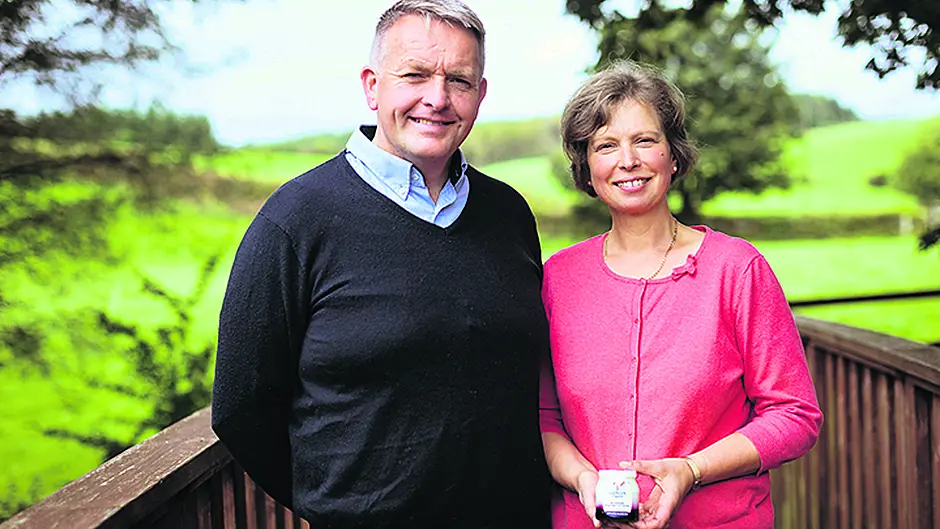From ‘typical dairy farmer' to producing the renowned Glenilen Farm product range, Alan Kingston tells Emma Connolly about the almost instant success of the brand
From ‘typical dairy farmer’ to producing the renowned Glenilen Farm product range, Alan Kingston tells Emma Connolly about the almost instant success of the brand
ALAN Kingston, who heads up the award-winning Glenilen Farm with his wife Valerie, said he never had any intention of building a business – it kind of just happened.
However, having just launched another new product, a range of sugar-free kids’ yoghurts, the couple’s success after diversifying into food production has been far from accidental.
Having inherited a 59-acre farm in the mid-90s, Alan described himself as a ‘typical dairy farmer’ who supplied to Drinagh co-op.
‘I left school when I was 15 and really wanted to go farming. I was happy enough, but I suppose I was under pressure to expand at a time when quotas and land were expensive.’
Restricted with the size of the Drimoleague farm, Alan and Valerie instead put value on what they had, which were milk and a great location in West Cork.
The seeds of the business were sown when Valerie, whose background was dairy science, began experimenting using their milk to make cheesecakes and yoghurts.
‘Valerie revolutionised our thinking and made us look at things outside the box,’ Alan recalls.
What happened was almost instant success for Glenilen, who started selling their yoghurts and cheesecakes at farmers’ markets which were growing in popularity at that time. And, while some fledgling businesses struggle to create demand, Glenilen struggled to keep up.
Key dates since then include building their first dairy on the farm in 2002 when they moved from selling to just markets to stores. They upgraded their facilities with a significant investment in 2008 when they moved from direct delivery to a centralised distribution model for their product suite, all made from Drinagh-supplied milk and which now comprises yoghurts, cheesecakes, butter, cream, cottage cheese and cordial made from lemons used in the cheesecakes.
‘We have had great support locally from people who saw potential in the product, such as the likes of John Field in SuperValu Skibbereen. I remember our first delivery there, when we got a red duplicate book from Pierce Hickeys and he showed us how to write our first invoice.
‘Also, Eugene Scally, Clonakilty, has been very supportive. People like that have been very influential along the way.’
Alan and Valerie currently employ a team of around 40 people in their creamery and are constantly both upgrading their facilities and looking at diversifying with new products and innovations.
‘The fresh food business has very tight margins so you’re always looking at ways to automate and remain competitive. You’re constantly asking how you can make a better quality product, more efficiently,’ said Alan.
‘It’s a bit like farming that way, where a farmer would try to knock a cent off the production of milk, against market prices he can’t control.’
Speaking of control, or lack of, Alan is just back from a week of meeting suppliers in the UK, where they export some 25% of their produce.
Naturally, he admits Brexit has caused a great deal of uncertainty: ‘Nobody knows what’s going to happen – it’s definitely a worry as it could go any way.’
Fortunately, tariffs on yoghurts are minimal, compared to cheese; however, butter is a more exposed product.
As a result Alan is looking at developing markets for their award-winning butter in Germany and France and exploiting this country’s strong reputation for the product there. And, they are also focussed on the new kids’ yogurts which are available in vanilla, banana and strawberry.
‘Only one in 10 products survive in retail in the first 12 months, so nine out of 10 fail. Lots of the larger companies will have KPI of at least 10% of their turnover to come from new product development. We aim for the same, but over the last three years it has accounted for about 12% of turnover,’ said Alan, adding that it wasn’t a cheap activity.
Glenilen have a small R&D facility on site and also work with UCC, Teagasc Moorepark and companies who provide yoghurt cultures to develop new products. Alan insists there’s never room for complacency.
‘For example, the kids’ yoghurt market is very busy so we have to keep asking why would a mum buy into this new brand? We have to be different, so we must keep on telling our story. If we expect people to pay that little bit more, we have to give them a reason for that,’ he says.
And, among those selling points are the provenance of their food and the fact that their yoghurts have a higher fruit content than most competitors. Glenilen Farm is also a business known for its commitment to sustainable practices. Among their innovations are a biodiversity plan which includes a man-made lake and wildflower planting.
Also, since last week, their cheesecake containers are made from 100% recycled plastic water bottles.
Modest about their success, Alan says: ‘We’re staying afloat anyway! I remember Myrtle Allen saying of Glenilen Farm in the early days, “its just common things done in an uncommon way”.’
He also quotes good advice from businessman Ben Dunne, who once said: ‘Give people what they want and you’ll be grand.’Alan adds: ‘It’s about keeping things very simple.’
He feels that innovation is more accepted in farming now, compared to when he and Valerie started, however most farmers have expanded so much in recent years that they are just too busy to ‘think outside the box.’
He admits to missing conventional farming, milking and going to the mart and the local interaction that involved. ‘But, we meet so many different types of people that I wouldn’t if I was farming full time. It’s an exciting life.’








